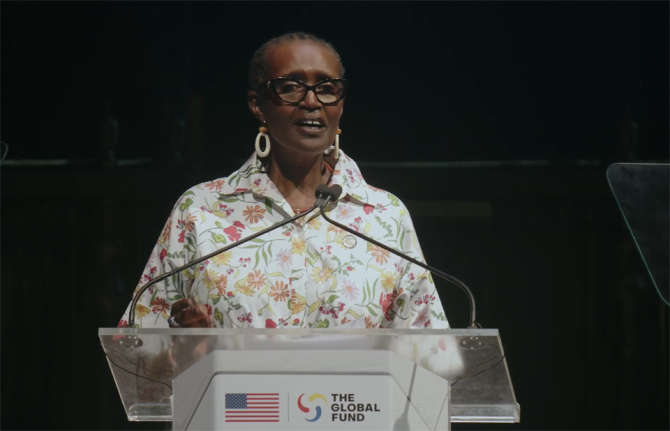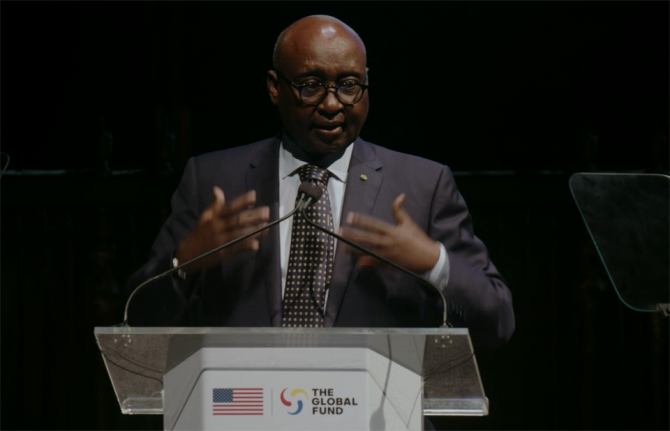



Press Release
UNAIDS urges donors to fully fund the Global Fund to Fight AIDS, Tuberculosis and Malaria to get the HIV response back on track
18 September 2022 18 September 2022NEW YORK/GENEVA, 18 September 2022—UNAIDS is calling on countries and donors to fully fund the Global Fund to Fight AIDS, Tuberculosis and Malaria by pledging a total of at least US$ 18 billion at the Seventh Global Fund Replenishment Conference hosted by President Biden in New York this week.
Speaking at the opening, on behalf of the United Nations family, the Executive Director of UNAIDS Winnie Byanyima said, “Millions of lives are at stake, along with the health of us all. A successful replenishment of the Global Fund to Fight AIDS, Tuberculosis and Malaria is essential to get the world on track to end three of today’s most devasting epidemics and instill resilience into national health systems capable of withstanding tomorrow’s shocks.”
In its July report, In Danger, UNAIDS revealed that the AIDS response is under serious threat from COVID-19 and the economic crisis, compounded by a continued decline in resources. It showed that while HIV infections should be continuing to decline in all countries, one in five of the world’s countries house rising new HIV infections. The rate of new infections globally only fell by 3.6% between 2020—2021, the smallest annual decrease since 2016.
The report showed that women and girls continue to be disproportionally affected. A new HIV infection occurred every two minutes among young women and girls aged 15—24 years old in 2021. Children are also being left behind—currently only around half (52%) of HIV-positive children were on life-saving medicines compared to 76% of adults.
“Now is the time for leaders to invest in their promise to end the AIDS epidemic by 2030 and to give children and young people a fighting chance at life,” said Ms Byanyima.
Since the Global Fund was established in 2002, UNAIDS has supported more than 100 countries to attract, implement and leverage Global Fund investments for HIV—making sure the money gets to people most in need. However, in recent years international solidarity in the fight against HIV has been weakening.
In 2021, international resources available for HIV were 6% lower than in 2010. The HIV response in low- and middle-income countries is US$ 8 billion short of the US$ 29 billion needed by 2025 to get the world on track to end the AIDS pandemic as a global health threat by 2030.
There are encouraging signs. The United States of America has announced that it will pledge US$ 6 billion to the Global Fund Replenishment contingent on the US$ 18 billion target being achieved in full. Other donors such as Germany and Japan have already announced increases of 30% in their funding pledges to the Global Fund for programmes covering the period 2024—2026. At its sixth replenishment conference, donors pledged US$ 14.02 billion to the Global Fund.
“This will be our most strategic step to get ahead in our fight against current and future pandemics, said Ms Byanyima. “The Global Fund’s model of responsive, inclusive and transparent funding will enable our collective success. But only if it is fully funded.”
UNAIDS
The Joint United Nations Programme on HIV/AIDS (UNAIDS) leads and inspires the world to achieve its shared vision of zero new HIV infections, zero discrimination and zero AIDS-related deaths. UNAIDS unites the efforts of 11 UN organizations—UNHCR, UNICEF, WFP, UNDP, UNFPA, UNODC, UN Women, ILO, UNESCO, WHO and the World Bank—and works closely with global and national partners towards ending the AIDS epidemic by 2030 as part of the Sustainable Development Goals. Learn more at unaids.org and connect with us on Facebook, Twitter, Instagram and YouTube.
